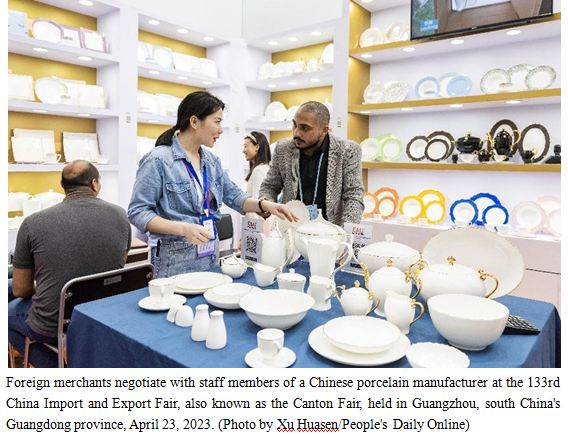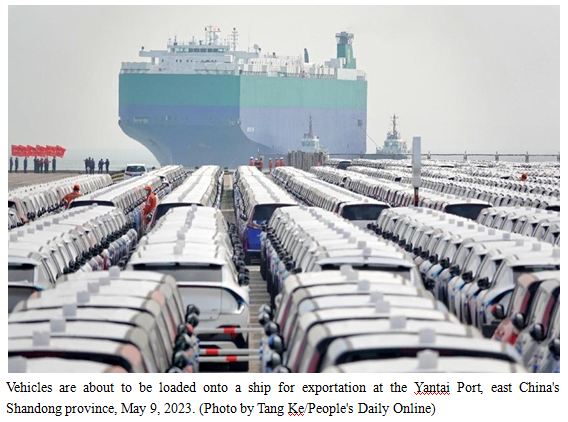By Luo Shanshan, Li Gang, People’s Daily
The 133rd China Import and Export Fair, also known as the Canton Fair, concluded on May 5 in Guangzhou, south China’s Guangdong province.
A series of creative and innovative Chinese products were exhibited at the event and received high recognition from global merchants, including intelligent manufacturing products, intelligent network-connected new energy vehicles, and childcare products.
The Canton Fair indicated that Chinese enterprises are taking a more proactive stance to join the global market, working to improve their trade capability and the added value of exports, so as to consolidate and expand their advantages of new industries.
“My new clients ordered four containers of commodities,” said Luo Qifeng, who runs a home appliance company in Ningbo, east China’s Zhejiang province, on the first day of the Canton Fair. According to the man, two Moroccan clients purchased over 1 million yuan ($144,494) of commodities.
The 133rd Canton Fair attracted over 9,000 new exhibitors and about 35,000 companies set up on-site exhibition booths. Export deals worth a total of $21.69 billion were signed during the offline exhibitions.
The event was joined by an enormous number of merchants and visitors, which mirrored the strong demand for Chinese exports, said Huo Jianguo, vice president of the China Society for World Trade Organization Studies.
China’s foreign trade sector secured a stable recovery this year as the country sees steady economic growth, as well as improving production and demand.
According to statistics released by the General Administration of Customs (GAC), China’s foreign trade got off to a good start in the first quarter of this year, with its value totaling 9.89 trillion yuan(US$1.44 trillion) and registering a year-on-year increase of 4.8 percent. In particular, exports stood at 5.65 trillion yuan, up 8.4 percent year-on-year.
Foreign trade is rising month by month. The growth of imports and exports in Q1 this year was 2.6 percentage points higher than that in the last three months of 2022. In March 2023, the ratio of laden export containers increased by 10.5 percent year-on-year, and the volume of imported cargo went up by 20.3 percent.
Central and western regions of China saw faster development of foreign trade. In Q1, relevant regions reached 1.84 trillion yuan in foreign trade, up 12.6 percent from the same period last year. The growth rate was 7.8 percentage points higher than the national average.
Besides, foreign trade via the New International Land-Sea Trade Corridor, a trade and logistics passage jointly built by western Chinese provinces and ASEAN countries, grew by 10.1 percent to 969.52 billion yuan. Regions including Chongqing municipality and Guangxi Zhuang autonomous region have leveraged their geographical advantages to facilitate cross-border transportation and improve logistics efficiency.
In the first quarter, China’s trade with ASEAN, Latin American, and African markets went up by 16.1 percent, 11.7 percent and 14.1 percent year-on-year, respectively, with the proportion of the combined trade to China’s total trade up by 2.4 percentage points to 28.4 percent.
About 25,000 more Chinese companies have opened foreign business in Q1 this year compared with that in the first quarter of 2022, said Lyu Daliang, spokesperson of the GAC.
Clothes, furniture and home appliances were once the major force of Chinese exports. Today, their position is gradually being replaced by electric vehicles, lithium batteries and solar batteries.
This year’s Canton Fair has added a new section on new energy and intelligent network-connected vehicles, where unmanned aerial vehicles, pure electric cars and new energy agricultural machines were exhibited.
Li Ming, vice president of Skywell New Energy Automobile Group, told People’s Daily that the company exported 300 pure electric vehicles in the first quarter of last year, and the number has exceeded 3,000 in the same period this year.
Li, who’s also the general manager of the company’s overseas business division, found that apart from the European market, the Middle East and South Asia are also interested in importing Chinese new energy vehicles. During the Canton Fair, the group inked a $7 million contract with a Pakistani car dealer, which included the exportation of 200 new energy vehicles of two models.
Over recent years, new energy and green development have drawn more attention across the world. The strong demand in the international market is driving the export growth of Chinese green and low-carbon products.
According to GAC statistics, the exports of electric vehicles, lithium batteries and solar batteries jumped 66.9 percent year-on-year to 264.69 billion yuan in the first quarter of this year. The number accounted for 4.7 percent of China’s foreign trade in the same period, 1.7 percentage points higher from a year ago.
The exports of these products helped raise China’s overall export growth by 2 percentage points and promoted the optimization of China’s foreign trade structure.



















